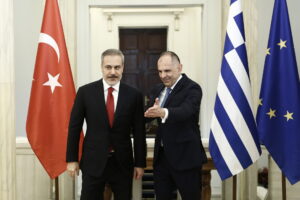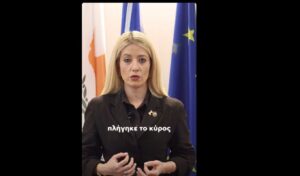With a strong dose of self-criticism, Alexis Tsipras admits in his book that some aspects of his governance could have been handled differently. The former prime minister, in a podcast discussion with Emilios Heilakis and Spilios Lambropoulos from Bookvoice, reflected on his experiences during the contentious years of the bailout memorandums and SYRIZA governance, as well as his later role as leader of the main opposition, attempting, as he said, not to be unfair to anyone. He even admitted that he read and re-read the book, changing certain words to ensure events were portrayed as they actually happened.
It’s not coincidental that while Emilios Heilakis is the “voice” of the book ITHACA, Alexis Tsipras narrates four chapters himself: the prologue, the epilogue, how the referendum was decided, and what transpired behind closed doors during the 17-hour negotiation at the European Summit.
Alexis Tsipras: How he wrote “Ithaca”
Alexis Tsipras revealed that he spent two full years writing the book. He was forced to stop for six months because he couldn’t capture the events of 2015 as he had experienced them, then resumed by describing the events to his associates. He noted that he didn’t write the book with “ulterior motives” – that is, to exploit it politically – yet meaningfully emphasized that he’s not writing as a retiree, like other leaders of that period.
“My intention wasn’t to politically exploit what I write and what I say for the present time. However, I don’t hide that my book has a special quality. And that quality is that no former prime minister writes in present tense. Everyone writes in past tense. I’m writing this book having decided that I’m not retired and therefore having decided that I’ll take criticism, because all the people I refer to are still alive and I don’t flatter them. I express my opinion about what they did and what they failed to do. I engage in self-criticism, but I also criticize others. This is a bold move. It takes courage. I haven’t seen anyone else do this. Everyone who has written has done so with the perspective of a retiree. Angela Merkel, Boris Johnson, Barack Obama. I haven’t seen anyone else write differently. And in this sense, it’s interesting. Otherwise it would be somewhat boring“.
He mentioned that the idea for his book was born while he was living through the tragic events of the negotiations, as he said, but “I couldn’t, while being active, either as prime minister or later as opposition leader, deal with recording history. So when I found myself, when I decided to resign, I had in mind that the time was coming when I needed to speak. Because, pay attention now, everyone has spoken about these dramatic events, about this dramatic period of modern Greek history“.
“I haven’t left anything out”
When asked if he left things out to avoid offending anyone or if he removed or softened any sharp edges, Tsipras replied: “I obviously haven’t left anything out. I admit that from the first draft to the final version, there has been editing, mainly not with an eye toward the future, but with an eye toward trying to be as objective as possible and as fair as possible, because you can’t be completely fair to people and events. For this reason, the book was written once, twice, and three times. I reviewed it many times so that every word represents me and is as close to the truth as possible“.
He emphasized, however, that the book isn’t only about 2015. “The third section is the road to Ithaca. That is, the thriller doesn’t end, the political thriller continues. Three years to implement this agreement, where the villains of the story returned to their original plan. We didn’t avoid Grexit in ’15, we avoided it in ’15, we avoided it in ’16, we avoided it in ’17 too“.
Alexis Tsipras also refers to the refugee crisis, the Mati tragedy, the Prespa Agreement, the television licensing issue, and Novartis. “And I reach the electoral defeat and the day after. There’s a chapter that is the lost opportunity for the country and for the Left. My own weaknesses, SYRIZA’s weaknesses, my self-criticism, but also criticism. And I reach 2024“.
In the 5th section, titled “What the journey left us“, the former prime minister describes the achievements – as he said – of that period, related to foreign policy: Greek-Turkish relations, Cyprus issue, Macedonia issue, our relations with Russia, China, the United States, the Balkans.
“There’s also a part about social achievements“, said Alexis Tsipras. “What we achieved. To emerge from this entire ordeal with the least possible wounds and with society standing tall. The epilogue refers to the present and future. I don’t know how difficult it is for someone to read a 730-page book“.
The personal moments
In the book, Alexis Tsipras also describes some personal moments, such as when on referendum day he forgot his son’s birthday. “The moments I describe are personal indeed, but they are embedded within a framework that is known, that is public, integrated within the context of a journey that was constantly under the gaze of Greek society. I describe some moments about how my partner and I experienced certain situations. How I felt, for example, when on referendum day it was my little son’s birthday and I didn’t remember it. What could you remember at that moment? And my partner was desperately trying to remind me and I was shooing her out of the room because I had a meeting, because the country’s future was at stake.(…) And when I realized it, let’s say I was devastated“.




